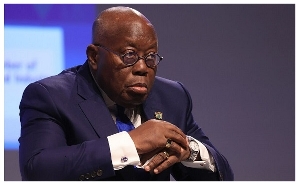 President Nana Addo Dankwa Akufo-Addo
President Nana Addo Dankwa Akufo-Addo
OccupyGhana and the Coalition of Civil Society Organisations (CSOs) have expressed worry over the delay in the passing of the Conduct of Public Officers Bill (CoPO).
According to the CSOs, the delays reflect a lack of commitment from the government and Parliament to tackle the growing issue of public corruption.
The groups expressed this opinion in a joint statement issued on September 4, 2024.
They argued that if passed, the bill would help address numerous cases of unexplained wealth.
The groups also alleged that the bill is currently facing strong resistance at the cabinet level.
“We are convinced that the recent issue arising concerning public officials and apparently unexplained wealth would have been resolved if the 2022 CoPO Bill had been enacted. Possibly, that is why the Bill is facing strong resistance in Cabinet against its approval.
“This is inexplicably shocking, considering that the 2018 CoPO Bill was previously recommended for Parliament’s adoption with minimum suggestions by the Parliamentary Committee on Constitutional, Legal and Parliamentary Affairs (Parliamentary Committee) in July 2020.
“The non-passage of any CoPO Bill since 2013 suggests governments’ and parliaments’ lack of commitment to fight the rising cases of alleged corruption, bordering on procurement and conflict of interest breaches in the Fourth Republic.”
“A recent Afrobarometer survey shows, “majority (77 %) of Ghanaians say the level of corruption in the country has increased and the government is doing a poor job of fighting corruption” and “many citizens (69%) see widespread corruption in key public institutions, but fear retaliations should they report cases of corruption to the authorities” (CDD, News Release, 28 July 2022).
“As widely reported, public institutions are undermined by corruption, leading to low public confidence in government and economic systems, and a low level of trust required for the operation of a market economy.”